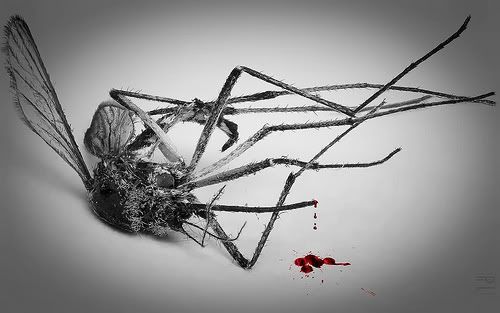West Nile Virus is on my mind after the news about why the local squirrel population plummeted.
I found some conflicting reports about West Nile Virus in my quest to find a clear statement as to whether or not pets or predators might pick it up from eating a diseased animal.
Zoonotic diseases are transmitted different ways and since transmission has been via mosquito I didn’t think this would be the case.
Turns out I may be wrong.
Originally I found some sources that said that eating an infected animal was not a problem for pets but then came across this gem:
Dogs and cats become infected when bitten by an infected mosquito. There is also evidence that cats can become infected with the virus after eating experimentally infected mice.
This is from the Center for Disease Control so I am more inclined to believe them–but I also think that there is a lot more to learn about this virus before anyone can make any solid statements…because they really don’t know how many ways it can be transmitted.
Imagine my further surprise when I found the Journal of Emerging Diseases published a very limited study on West Nile Virus which had this to say,
The high efficiency of oral transmission observed with cats suggests that infected prey animals may serve as an important source of infection to carnivores.
Not exactly what I wanted to find since we have a bunch of carnivores around there parts–both wild and domestic.
So far it appears that body mass is influential as is age and condition.
Originally the threat was identified as a bird-mosquito-bird cycle. Mosquitoes feed on a bird with virus in its blood and then the virus is transmitted to a new host via the insect’s saliva when it bites.
Humans and horses have been labeled as “dead-end hosts” because they do not transmit and infect other mosquitoes when bit.
There are WNV vaccines for horses but not for other pets.
West Nile virus does not appear to cause extensive illness in dogs or cats. There is a single published report of WN virus isolated from a dog in southern Africa (Botswana) in 1982. West Nile virus was isolated from a single dead cat in 1999. A serosurvey in New York City of dogs in the 1999 epidemic area indicated that dogs are frequently infected. Nonetheless, disease from WN virus infection in dogs has yet to be documented. Read more on WNV at the CDC.
You can find more WNV info at the American Veterinary Association website and other horse and pet related WNV facts here (although the last link seems a bit outdated, it does answer some of the questions I’ve been asked).
The University of Illinois also has this WNV fact sheet on domestic animals.
What are the symptoms of West Nile Virus?
Experimentally infected dogs showed no symptoms after infection with WNV. Some infected cats exhibited mild, nonspecific symptoms during the first week after infection–for the most part only showing a slight fever and slight lethargy. From the pet WNV q&a here.
The main caution is that humans need to avoid using non-veterinary products on pets due to toxicity risks.
Check with your local veterinarian for his or her recommendation but here is a partial list of animal approved repellent products–and if you purchase online you help support the Ark Animals blog:
- Mosquito Repellents for Animals
- PreStrike Mosquito
- Adams Flea and Tick Mist
- Petguard Gel
- Ultrashield
- VIP Repellent Ointment
- Happy Jack Flea-Tick Spray (Check with your local pet stores.)
If you live in California you can read more about the California West Nile Virus here.
How is the West Nile Virus issue in your area? Leave your answer below.
Photo Credit: Pil


